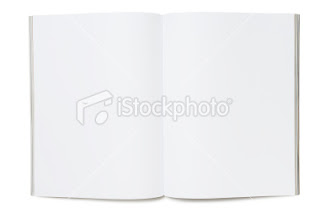The reflection of your empty soul.
Alright, enough of the melodrama. Writer's block. What is it anyway? Well that's a tough question to answer. Writer's block is one of those intangible things like love or hate that everyone talks about but there's no real definition for. Everyone has their own opinion, their own experience of it. You know it when you feel it. Writer's block is a curious malady. There isn't anything wrong with you. You can type and move a pen, you can make the physical movements of writing. You can think, make things up and make decisions about your story. And yet you sit there paralyzed, seemingly unable to do anything. You can't see it, can't explain it, and yet there it is. Stopping you from doing the thing you want to do with all your heart, all your soul. You can talk to your friends for hours about your story and the characters and the world they inhabit, but when it's you and the blank page, the page wins.
Well there's a couple of reasons why you may be stricken with this strange malady. I'm going to bypass the easy things like simple laziness. When the problem isn't the writing but actually getting your poor butt in the chair and writing. And there's the other common problems of stress in life that clutters up the brain and could be solved with a simple walk and some fresh air. No, I'm talking about the writer's block. The one that cripples you for hour after hour while you stare at the computer, typing a sentence over and over only to delete it every time. When nothing seems to flow. When your muse has left you for some other tortured soul.
And by tortured soul we mean hipster.
In my limited experience I've found that those disabling cases of writer's block have nothing to do with the actual writer, and everything to do with the story. In all the times I've been locked down creatively and unable to write, it's because some part of me was trying to tell the rest that something was wrong with my story. Sometimes I'm coming at a plot or a scene from the wrong angle. Other times it may be because I don't understand my characters well enough to know how they would react. Or it may be that the particular story simply isn't that good, or interesting. I'm actually secretly dreading writing the thing, and that manifest itself into writer's block. Every single time I've had it, I've found there was a reason.
There's an upside and a down to that. The good news is that writer's block isn't some demon that's slain your muse in the night. It's not a mysterious disease that passes from creative type to creative type, landing on whatever poor sod was unlucky enough to catch it this week. The down side is it means there is a real problem with our stories. A fundamental, structural weakness in the foundation that could bring the whole thing down. Even worse, I have yet to find a catch all cure for getting past those problems, for isolating them and solving them right away. Sometimes you have to walk away from the problem, other times you have to muscle through it, pounding away at your keyboard until something snaps and you're through to the other side.
Writer's block is something that has stricken creative types since the dawn of mankind, and I assume will affect us long into the future. Remember however that it does have a cause. There is a reason for it.You don't have to fear the shadow on you brain any longer, the doubt and insecurity that comes with the blinking cursor. Know that it is not a red light, but a yellow, cautioning you against the unseen dangers in your story, the fog that obscures your eyes as a creator. And most importantly, that you can beat it.

